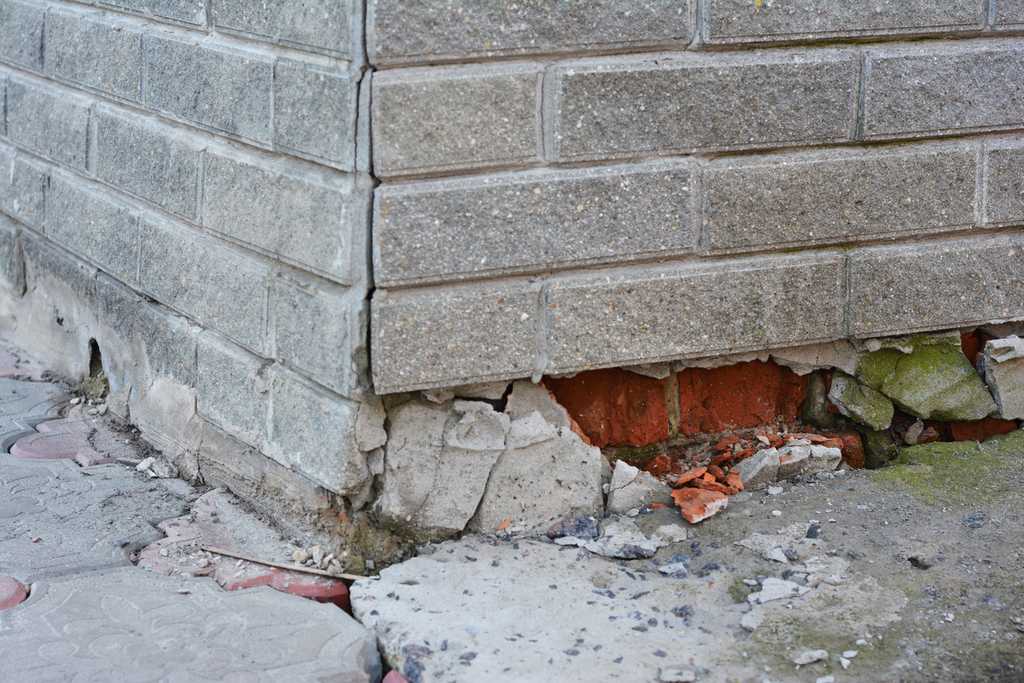When it comes to protecting your home, a good homeowners insurance policy can help cover against most common perils. While many may cover damage to your foundation, your insurer may not accept your claim in all instances.
Find out what types of foundation damage are excluded from a standard homeowners policy and what it could cost you if your claim is denied.
When foundation damage is covered by insurance
Foundation damage will usually be covered by your standard homeowners insurance policy depending on what caused the damage in the first place. It might be helpful to call a professional that specializes in foundations to see what the issue may be and what caused the damage. Their report can help you decide whether you should file a claim with your home insurance company and how extensive the repairs may be.
When it comes to your home foundation, coverage for your foundation will most likely come from Coverage A, where it offers protection for the structure of your home. Depending on your policy, you’ll only be protected against covered perils that are specifically named. If the cause was due to a listed peril, your insurance will typically cover the cost minus your deductible.
In most cases, homeowners insurance policies will cover repairs to your foundation for the following perils:
- Explosions
- Falling objects
- Fire or lightning damage
- Vandalism
- Windstorms
- Water damage (not all will apply, though generally will be covered if it’s from causes like an overflow to your HVAC or plumbing system)
- Vehicle or aircraft damage to your home
It’s best to read through your homeowners insurance policy thoroughly to see exactly which perils are covered in your policy. If your foundation was damaged due to covered perils, then it’s most likely your insurer will approve your claim.
When foundation damage isn’t covered by your policy
Unfortunately, some of the most common causes of foundation damage aren't covered by your policy.
These include:
- Natural settling of the foundation
- Natural cracking, bulging, expansion or shrinkage of the foundation
- Tree root pressure
- Faulty construction
In other words, homeowner insurance policies don’t approve claims where the damage to foundation is caused by normal wear and tear. Most likely, insurers offer coverage for damages due to more sudden and accidental damage — maintenance or damage over time don’t count since maintaining a home is the homeowner’s responsibility.
What’s more, two other natural disasters, floods and earthquakes, are usually excluded from your standard homeowners insurance policy. If your foundation was damaged due to any of these causes, your claim would most likely be denied — you may want to consider purchasing a separate flood or earthquake insurance policy if you live in a location where it’s common to experience these types of disasters.
What you can do if you're not covered by homeowners insurance
When foundation damage isn’t covered by homeowners insurance, you’ll have to pay it for yourself out of pocket, unless you can provide solid proof the damage was caused by a covered peril.
For instance, if your foundation was damaged due to a burst pipe, you may have a better chance of getting coverage than if the damage was due to an external flood. Your best bet is to hire a professional to determine the cause of the damage first — their report will help inform you about whether to file a claim.
If you need to pay out of pocket, then it’s best to get a few estimates to find the best price and fit for your needs. There are several ways to finance the cost, whether that’s through a personal loan or other means.
For homeowners who are concerned about their foundation, it’s a good idea to try and prevent foundation issues in the first place.
Here are a few suggestions:
- Get your home inspected: Before moving in, get your home professionally inspected to understand how well-built the home foundation is and whether there are any issues to be aware of. It might also be useful to inspect the home every few years after moving as well.
- Clean the gutters: Clogged gutters could mean any time it rains, the water will spill directly into the soil close to your foundation.
- Watch out for trees: Ones that are close to your home can eventually have their roots grow close to or into your foundation. If you’re concerned, consider relocating or cutting them down altogether.
- Act fast when you see cracks: Hopefully when you notice them it isn’t a major deal, but as soon as you see cracks, get a professional to see how severe the issue may be. The sooner you act, the less it could cost you to get the foundation fixed.
How much does foundation repair cost?
Your final cost will depend on several factors such as the type of damage and how long the damage has been there for. Minor repairs can set you back a few hundred dollars, whereas larger repairs can cost upwards of $10,000 or more.
What are the signs of a bad foundation?
If you notice a few of the following signs, it could mean that you have foundation issues:
- Shifting: If your support posts, ceilings, walls or floors aren’t level, it could mean your foundation is shifting or settling. Other clues could be that your doors or windows don’t latch, open, or close properly.
- Cracks: If there are cracks that are becoming longer or growing in your home’s chimney, tiles, home exterior, or even interior sheetrock, it could be a sign that your foundation is cracked.
- Wet crawl space: If the crawl space is really wet or flooded, it could mean your foundation is cracked or crumbling.
How do you file a claim for foundation damage?
Before filing a claim, it’s best to determine whether you should. If the cause of the damage isn't covered by your policy, then your best next step is to determine how much the repairs will cost and how you can budget for it.
If after consulting a professional, it seems likely that the cause of damage will be covered, then you should contact a contractor if the damage is considered an emergency (like after a major natural disaster).
Then, contact your insurance. Although each insurer will have its own process, you’ll most likely need to do the following:
- File a claim online by providing detailed information about the extent of the damage, such as photos, a description of the peril and a police report, if applicable
- Work with the claims adjuster the insurance company provides so this person can come to your home and assess the damage
- Contact a contractor or foundation specialist to determine whether the damage was due to a covered peril in case the adjuster determines otherwise
- Work with the insurance company if your claim is approved for when and how repairs will be completed

